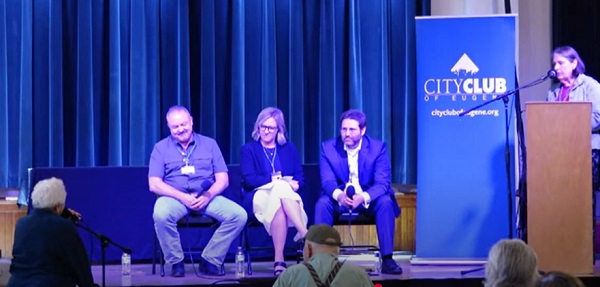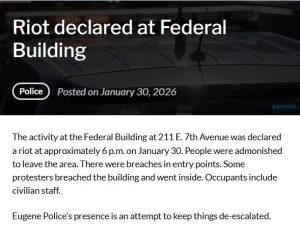Eugene City Club looks back at the repealed fire fee
9 min read
Presenter: The City Club reviewed this year’s contentious city budget deliberations, with three speakers who were directly involved.
[00:00:07] Tai Pruce-Zimmerman has served on the budget committee for the last seven years, the last four as chair. At the City Club Sept. 19, he said most years the city has more money going out than coming in.
[00:00:22] Tai Pruce-Zimmerman (Eugene Budget Committee, chair): Sixteen of the last 19 city budgets in Eugene have been cut budgets. For decades we’ve been in this position where the cost of providing the same services in the same way year over year is just consistently increasing faster than our revenues are. So almost every budget, we have a gap that we have to fill somehow.
[00:00:43] We can either cut service, find new ways to deliver the same services more efficiently, or find a way to raise revenue. Those are the only three mathematical options that can close that gap.
[00:00:54] Now, the cost increases have a multitude of drivers. Some of it is PERS, some of it (in this most recent budget) inflation, which had spiked, played a big role. But that can come from a variety of places.
[00:01:07] The limits on revenue growth are due mostly to ballot Measures 5 and 50, which were passed in the 1990s. So those measures placed a variety of limitations on property taxes in the state of Oregon. And property taxes are the primary source of revenue for the city’s general fund, which is the part of the budget we have discretionary control over.
[00:01:27] The well-known part of what those measures did is put a 3% cap on how much property taxes can rise year over year. That part is popular. It’s a protection. It’s a reasonable protection against runaway tax increases.
[00:01:40] Then there are other aspects where tax assessments don’t reset when properties are sold, newly-built properties come on the tax rolls at sometimes as little as 40% of their initial market value. These are the other behind-the-scenes exacerbating provisions that really create the budget problems that we’ve been seeing statewide.
[00:01:59] Eugene’s not alone in having these regular cut budgets. You’re seeing it in nearly every major city in Oregon, nearly every county, nearly every school district. Everyone’s dealing with this.
[00:02:09] Presenter: Earlier this year, the city council adopted a recommendation from a revenue committee, to bring in $10 million dollars each year through what they called a fire service fee. The Chamber of Commerce blocked it from going into effect. To explain why, Chamber President and CEO Brittany Quick-Warner:
[00:02:30] Brittany Quick-Warner: We really think that in order to address the structural deficit, we have to look at both sides of the equation. We’ve got to look at efficiencies and how we have been providing services in the past and how we might need to do that differently to accommodate, as well as potential revenues going forward.
[00:02:46] We ultimately asked the council to maybe take a different approach to look at prioritization of our services first before we ultimately adopted this fee. Within when we saw it was going to move forward asked them let’s just send it to the voters. If we’re going to have a permanent fee that’s passed let’s give the voters the opportunity to say yes or no to that.
[00:03:03] Ultimately, Council decided on Feb. 10 to go ahead and pass the fire service fee themselves on a 5-3 vote. And after that vote, we did a lot of due diligence, really. We completed a survey from our membership. We did a public opinion poll really to try to determine where the public was at on this and that they felt like they needed a say in that fee.
[00:03:22] Ultimately with that information and a lot of careful consideration—we have in my time at the Chamber never done a referendum before so this is not normal practice for our organization—our board ultimately decided to initiate that process.
[00:03:35] In three weeks we went out with the help of signature gatherers (which is completely legal and part of our public process), we collected more than 8,000 signatures from voters saying, ‘We want to have a say in this.’ And that was ultimately our goal is to put this on the ballot so the voters could decide about this fee.
[00:03:52] Why we did that: There were a few initial concerns that we had that we think are still kind of fundamental as we go forward and look at budgeting processes.
[00:04:00] First is that this was a permanent fee that could rise every single year with council vote at any level. I think that’s really a pretty serious decision that our councilors made and one that I think the public appreciated maybe having a say in.
[00:04:17] The second is the way that this view is formatted, being called a ‘fire service fee,’ we feel like wasn’t as transparent as it could have been. We believe that because 80% of the funds that would have been raised for this fee would be backfilling the gap that we had in our budget, and only $2 million new dollars would be going to fire, people were going to assume that this was a $10 million fee that was going to boost our fire services, and that wasn’t the case. And so we really felt like the way that this was formatted, it could have been more transparent to the public.
[00:04:45] And then lastly, we knew that this didn’t totally solve our problem, right? So there was still a budget gap that cuts would have to be addressed even after this fee was proposed and I think that would have been surprising to the public as well.
[00:04:58] So we really felt like we needed a more comprehensive plan that kind of looked at a lot of different pieces to help the city live within its means and make sure that the community was prioritizing the services that they wanted.
[00:05:09] We also think the biggest piece of the conversation that has been missing is that our city, our county, our state has for many, many years not put a priority focus on expanding the tax base. Not increasing the number of dollars that the folks we have here are paying, but expanding the number of people who are paying into this tax base.
[00:05:30] The way that we do that in this state is by income taxes and property taxes and in order to drive those up we’ve got to have more businesses, we need more jobs, we need to be paying higher wages. And in order to make that happen we have to focus on it.
[00:05:43] That doesn’t happen accidentally, it has to be a very proactive approach towards growing our tax base in that way. And we implore the city and the community to focus on that more, because we really think it can overall support all of these things that our community wants to see.
[00:05:58] Presenter: The budget process starts each year, assuming the city will preserve all services at the same level. City Councilor Mike Clark:
[00:06:08] Mike Clark (Eugene, city councilor): We have no mechanism by which we as a community can say, ‘We don’t think the city should be in the business of providing this service anymore,’ whatever that service is.
[00:06:21] We don’t have a process by which we have a transparent community conversation about what we can’t afford to continue to do. And I think we should. I think it’s an important part of the conversation.
[00:06:36] Every year’s budget starts with providing the exact same things as we did last year, will cost X in the following years. And that’s where we come up with the $11.5 million deficit is saying ‘to provide the same services we have in the past will cost more than we have coming in.’
[00:06:57] And the system that we have set up is controlled by many other folks than just the people in Eugene. The state legislature puts mandates on us, collective bargaining agreements with our employees commit us to expenditures into the future, so, and everything that we decide about how much money we spend is not entirely within the scope of what the Council and the Budget Committee does.
[00:07:24] And here’s a fact. The city of Eugene has never spent less money in a year than it did the year before. Never. All funds in, all dollars, we have always spent more money the next year than we did the year before. And that’s inside of an environment where the people who live in our state have decided we’re not going to increase taxes (that pay for the vast majority of that) more than 3% a year, period. Not going to happen. So that requires us to face some difficult decisions.
[00:08:03] I suspect that we’re going to see ourselves in difficult decisions about competing priorities for many years to come. And it might do us some good to say, in a creative fashion, what problems have we solved? What issues are no longer ones that need to be addressed by the city of Eugene in the way it is?
[00:08:29] Should we have a process to say we’re not in the business of providing ‘X’ service anymore? That’s something I think we should at least discuss.
[00:08:37] But it also, I think, leads to the necessity for us to say, ‘Okay, if we can’t get more money from all of the current taxpayers, how do we bring in new monies from new taxpayers?’
[00:08:52] Presenter: He also proposed a small change to improve the Budget Committee. Councilor Clark:
[00:08:58] Mike Clark (Eugene, city councilor): I believe that the city’s budget process could be more representative than it is. We saw some controversy in this year’s cycle because of some people feeling that they weren’t part enough of the conversation and some very difficult decisions that they wanted to have more conversation about it amongst the community as a whole and have the community vote. And I believe we could do a better job as council by bringing more people into the budget conversation in future years.
[00:09:33] We have a process of voting on the council’s budget committee members, the volunteer citizens that work on the budget committee, by means of council majority, and you can’t get around that, no matter what we do with a representative of a public like ours, we’re going to have to have a majority votes kind of situation.
[00:09:55] But I believe it might be worth us considering a model like the counties where each councilor has the opportunity to name and appoint an individual budget committee member rather than having the council majority choose all the budget committee members. I think in doing that we might get a more robust selection of people on the budget committee and we might allow for more people to feel as though their voices were heard in the conversation.
[00:10:29] Presenter: During the question and answer session, former City Councilor Betty Taylor:
[00:10:34] Betty Taylor (City Club): I agree with Mike Clark again. We agree sometimes. And I think every councilor should appoint a Budget Committee (member). Actually, I’ve suggested that in the past, and it was not agreed to, but I think it’s a good idea.
[00:10:52] I wonder if you know that City Club did a study of revenue sources in the past and published it. And I don’t know if you’ve seen that or not, but there were some good ideas. And one idea that, I think it was in there, I know that some cities do it, is they find a way to use a part of the lodging tax.
[00:11:13] Presenter: City Club takes a look back at a contentious budget cycle. Councilor Clark suggests the city may need a process for retiring city services, and former Councilor Betty Taylor endorses the idea of adding more representative voices to the Budget Committee.




